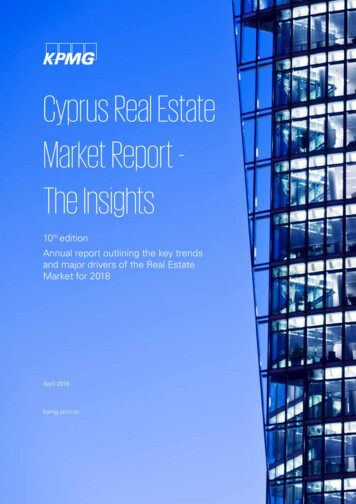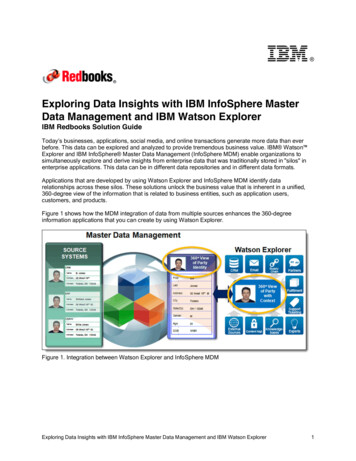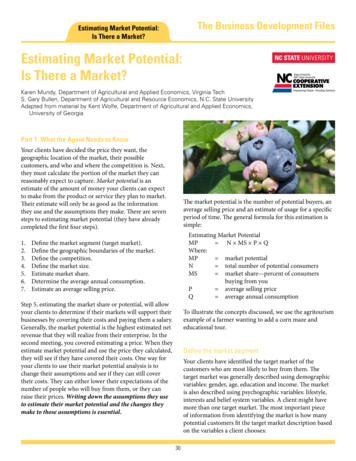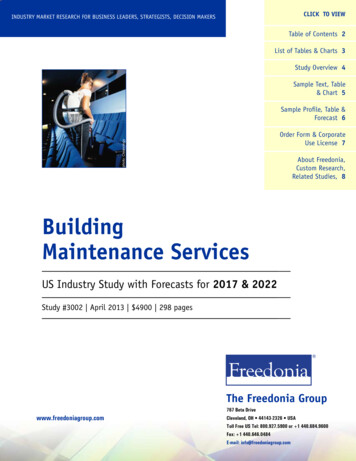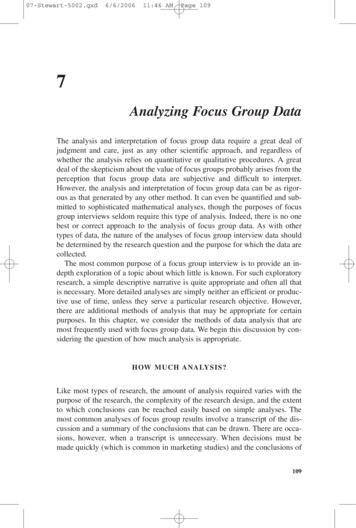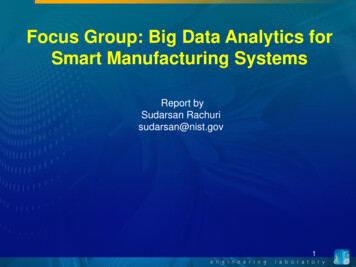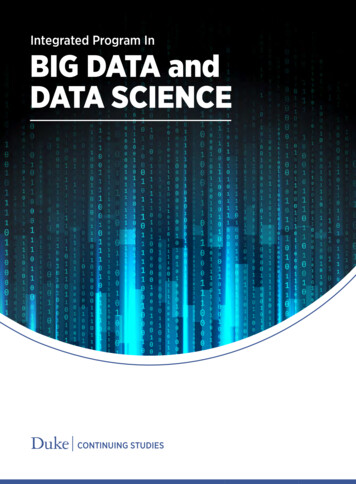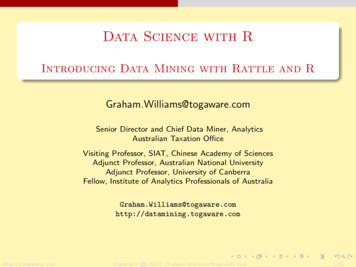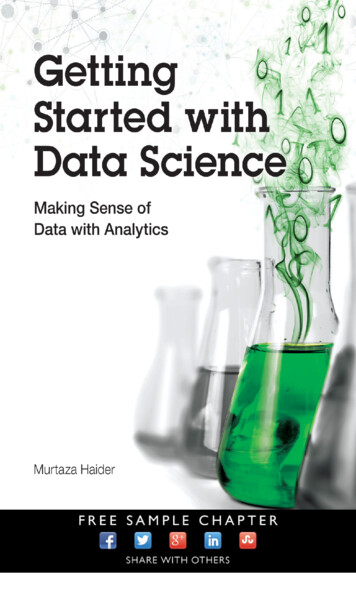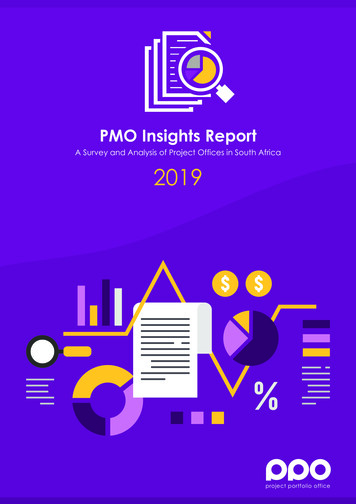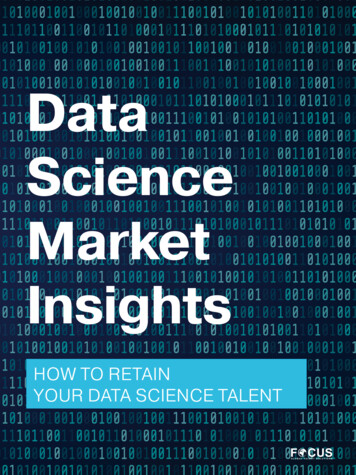
Transcription
DataScienceMarketInsightsHOW TO RETAINYOUR DATA SCIENCE TALENT
HOW ARE YOUSUPPOSED TORETAIN YOURTALENT?INTRODUCTIONTHE DATA SCIENCE MARKETCoined as, “the Sexiest Job in the 20th Century”, positions for data scientists areon the rise and ever expanding. Data Science is touching markets from healthcare,telecommunications, retail, transportation, and agriculture, to name a few. Asbusinesses implement AI and Big Data into their toolkit to better serve their customers,they are looking for the right people to execute their vision.At its core, data science is a concept that integrates many skills like data analysis,machine learning, problem-solving, and related methods to communicate andunderstand real problems shown by the data. With these needs, businesses are hiringdata scientists to solve all sorts of issues.
MarketWatch projected the “Data Science And Analytics Marketis expected to grow at a Compound Annual Growth Rate (CAGR)of 15%. The base year considered for the study is 2018, and theforecast period considered is 2019 to 2025.”With the rapid influx of demand, the talent supply hasnot kept pace.Indeed, one of the most utilized jobs search enginesreported that“Since December 2013, data science postingshave rocketed 256%—more than tripling.”“While postings have surged, job searches fordata science positions have grown more slowly.Data Science searches as a share of all searchesrose almost 14% in 2018—a healthy gain, but farless than the rise in job postings.”Now imagine having the title “Data Scientist” on yourLinkedin profile. Within this last year, you would havereceived a call nearly every day to see if you wereinterested in an opportunity. Due to these facts,data scientists are consistently poached and leavingexcellent opportunities for more promising positions.Recently, the Financial Times published an alarmingstatistic that data scientists typically “spend 1–2hours a week looking for a new job.” Why? That’swhat you are here to find out.We recently asked a data scientist, “Why they left theirprevious role?” One candidate said,“Why would I stick around for a 1-5% increase forgreat work when I can move to another companyfor a 20% increase?”From this response and the information stated above,there is no denying the data science talent market is morecompetitive than ever. You’ve spent a lot of time, money,and energy to recruit your talent. The question is onceyou’ve hired this talent, how do you retain the talent?Now you might be wondering why a recruiting companywould write an in-depth study on how to retain your talentwhen recruiters are often the vehicle for why your expertis leaving. It could be confusing, but we see ourselves as astrategic partner with the companies we work alongside.We know how hard it is to hire the talent, so we wantto help you retain it!At the top of the list, you are going to see competitivesalary, benefits, flexible schedule options, the ability towork from anywhere (home, or a coffee shop wheneverneeded), work environment, visa sponsorship, and tuitionassistance. These are amongst the few things people arelooking for on the surface, but it’s so much deeper thanthat.The answer to why your unicorns seem to disappearmagically may be found in Tony Robbins’ Psychologicalconcept known as “The 6 Human Needs”.
THE 6HUMAN NEEDSWe all have the same six needs, but howwe value those needs and in what order,determines the direction of our life.- Tony RobbinsEmployees will thrive in environments that fulfill, what Tony Robbins refers to as, the six human needs.With over 40 years of experience, Tony has boiled it down to 6 areas that drive all of our decisions,and each of us tries to fulfill these needs some way or another in our life. With our careers taking upon average 1/3 of our life. It is crucial to choose a job that meets those needs for long term happiness.These needs are in no particular order, but we all have two needs that are most important to us and willdrive all of our decisions.
CERTAINTYTHE ASSURANCE YOU CAN AVOID PAIN AND GAIN PLEASURE.For some people, certainty is their most significant need. Thesepeople need to know exactly what is going to happen. They wanta clear path for their career, and stability is a must. If you arelooking to hire a data scientist whose primary need is certaintyyou need to make sure there is a clear plan for them or they aregoing to jump ship when things get messy.JOB ROLESAs the data science industry matures, we will see more clearlydefined roles and responsibilities. (At least we hope so!) Ofcourse, data science can be used in all fields, and how it is utilizeddepends on what the business needs and what their goals are.However, time and time again, we see job descriptions thatdon’t line up with the day to day tasks of what the data scientistis doing.According to Forbes, “80% of a data scientist’s time isspent on cleaning and organizing data”,which is the last thing they want to be doing. If you promisedthem they would be solving the organizations most complexproblems, yet instead, they are spending all their time cleaningand wrangling data, their expectations don’t match reality andthey are left disappointed.Now don’t get it wrong every data scientist knows this is a key tosuccessful data science work, but if 80% of their time is spentcleaning and wrangling data you can be sure they won’t lastlong if they are a real data scientist looking to solvecomplex problems.Brooks wrote,“you’ll be the analytics expert, as well as thego-to reporting guy and let’s not forget thatyou’ll be the database expert too.”Nevermind that none of these were what youthought you were hired to do—you are suddenly thedata expert of all of it. (Now, if only you could getthrough prepping the data.)
COMPENSATIONWith certainty driven candidates, payment is a significant factor. They willneed to know what they are going to make and that it will meet all of theirfinancial needs. Typically, bonuses or stocks are not appealing to thiscandidate because they rely on too much uncertainty. An excellent compplan with a clear path for their career will be a point on the scoreboard.They are less likely to leave if they know for sure the company is taking careof them and will continue to do so in the future. With the market being socompetitive, you will want to make sure to have a review structure in place.Reviewing their salary only once a year with an incremental increase of1-5% highly increases the likelihood of your data scientist responding torecruiter’s message on Linkedin, perhaps from myself or Elizabeth.Understanding the marketplace compensation for your local area iscrucial when competing for the best talent. Don’t merely rely on a Googlesearch or Indeed, make sure you do your research.Recruiters have the latest information on marketplace salaries, andthey are placing talent every day. Your recruiter should be more thanjust someone who puts talent on your team. They should be a strategicpartner whom you look to for essential market information even when youaren’t hiring.LEADERSHIP AND MANAGEMENT SUPPORTCandidates who are driven by certainty need to know there is anestablished plan in place for the work they are doing. They need to seethe leadership in a place that will help achieve those goals.This doesn’t just affect certainty driven candidates; this applies all acrossthe board. No one wants to work for a company where leadership isn’tsupporting their work or leadership who doesn’t understand the value adata scientist can bring to the table. Nothing will make a candidate leavequicker than someone in charge of them who do not understand theirwork or value.One data scientist shared this about his previous job,“There was no established data science team. The manager wasway too inexperienced (25 yrs old) to be a Director, and there wasno game plan. Without any direction/specific project, I was told to“think of it as my own company and solve problems”. That’s a redflag. Also, I was told, “I want you to be so passionate about workthat you will lose sleep over it”. The manager was never availablefor defining actual project/ questions.”
UNCERTAINTYTHE NEED FOR THE UNKNOWN, CHANGE, OR NEW STIMULI.Strangely enough, the 2nd human need is uncertainty. If this need drives people on your team, it can be fulfilled inmultiple ways!FLEXIBILITY OF SCHEDULENot all jobs can be remote (the golden job), but an employer should be open to allowing their team to work remotelywhenever needed. We are all people that have real needs, families, and responsibilities. Now more than ever,people want the ability to spend time outside of work with what matters to them. The most crucial aspect of a remoteor flexible schedule is the result! Is the work being executed? If they can make that happen with a flexible workschedule, you are going to have a happier employee and even better quality of work.Zenfits stated, “73% of employees said flexible work arrangements increased their satisfaction atwork.”Another way to satisfy this need for your data scientist is through risk. What does this mean in the workplace?Your data scientist will thrive in an environment that is fast-paced and ever-changing. Startups and consultingcompanies are a great match for those driven by variety. They love opportunities where they can explore newtechnologies, work on different projects, and in different environments. Typically, they are open to the flexibility ofpay. Stocks/equity and bonus pay structure options intrigue them.Their appetite for risk is high, and having an opportunity where they can fulfill this need is a significant plus.
SIGNIFICANCEFEELING UNIQUE, IMPORTANT, SPECIAL OR NEEDED OR NEEDED.People who are driven by significance needto feel important. Accomplishing a challenge,figuring out a problem and providing value issomething that comes second nature to them.They look for places where they know theirwork is going to make a difference. They enjoyshowing their skills and capabilities. Goals,titles, education, and receiving feedbackhelps them fulfill their needs and assess howthey can get better. They don’t mind climbingthe ladder.EDUCATIONPursuing higher education or becomingcertified in a specific technology can be anambition they hold. They want to be up to dateon the latest versions of applications. Providingvalue to the company and contributing to theteam, hits the spot for them. If they are in a workenvironment that does not value education asan investment, they might find a company thatdoes.PROJECT TYPEProjects that seem unimportant, mundane,or useless will drive a significance driven datascientist crazy! This doesn’t mean they won’tdo busy work, but it may leave them feelingunimportant or undervalued, and when anemployee starts feeling undervalued, they willexplore other opportunities.
A STRONG FEELING OFCLOSENESS OR UNIONWITHSOMEONEORSOMETHING.CONNECTIONLove and connection scream culture and cultureis everything in this fast-moving industry. As weknow, data scientists have options, and if loveand connection drive them, they will be mindful ofculture and take notice.TOXIC ENVIRONMENTSIf you have ever experienced a toxic environment,you know the weight it brings to your life. It’slike a dark cloud that never goes away. Theseenvironments kill the soul and the joy of going towork. If there is no connection, encouragement,and it’s all work and no play, you can bet yourunicorn driven by this need will be leaving quickly.According to research by the Gallup organization,they “encourage employees to have good,even best friends, at work. This will increasetheir commitment to you as an employer.”Relationships, connection, and communication arevital to them. They go deep, give respect, and wantrespect. They listen and want to be understood.COMMUNICATION IS KEYHealthy communication is a need that needs to befulfilled. Ridiculing or shaming is never the way to go.If communication is limited or close to nonexistent,this will deter them away from a role. When it comesto training and coaching, they enjoy learning andthrowing out their ideas, giving feedback, etc.“People who have a “bestfriend at work” are not onlymore likely to be happierand healthier, they are alsoseven times as likely to beengaged in their job.”-UC Berkeley’s Greater Good Magazine
GROWTHAN EXPANSION OF CAPACITY, CAPABILITY OR UNDERSTANDING.Growth is a primary driving need in the workplace. The idea of solving complex problems with (high tech machinelearning tools) is attractive to many if not all data scientist. It’s the reason they got into the game. If you have noreal data strategy in place, this can be a turnoff. They want to be challenged and stretched.One Data Scientist said,“I learned never to join a team where you are the only Data Scientist. Also never join a team where thereare no defined projects. If you hear “when you join, we can talk about projects” run the other way.”People want to work for companies who are innovative and willing to invest in new technology when it’s neededto get the job done. Opportunities that allow them to grow their skill sets in leadership and their technical skills issomething they desire.Education/tuition assistance, conferences, workshops and seminars are deemed valuable to a person who isgrowth driven.
CONTRIBUTIONA SENSE OF SERVICE AND FOCUS ON HELPING, GIVING TO AND SUPPORTING OTHERS.Given that data science at its core is solvingproblems to give a company the ability to makebetter decisions and in turn, serve their customers.The contribution driven employee is all game. Theywould be thrilled to contribute their ideas, energy,and best efforts to the company’s mission.Another data scientist told us he left his previousrole because his projects revolved around,“making people click stupid ads! Exciting isn’tit?”Where is the real contribution here, apparently thatdata scientist did not see it.As a director, you don’t dictate the service or project,but you do have a say in what type of problems yourdata
THE 6 HUMAN NEEDS Employees will thrive in environments that fulfill, what Tony Robbins refers to as, the six human needs. With over 40 years of experience, Tony has boiled it down to 6 areas that drive all of our decisions, and each of us tries to fulfill these needs some way or another in our life. With our careers taking up on average 1/3 of our life. It is crucial to choose a job that .
